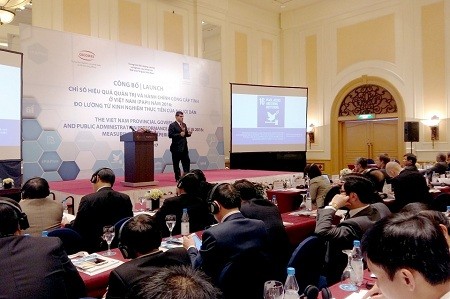(VOVworld)-The 2016 Provincial Governance and Public Administration Performance Index (PAPI) report, released in Hanoi on Tuesday, shows improvements in public service delivery.
14,000 people randomly selected from across Vietnam were interviewed for the 2016 PAPI, which assesses citizens’ experiences with national and local governance, public administration, and public service delivery.
According to the report, the public service delivery index increased sharply in 35 provinces and cities, with Can Tho city taking the lead. There was a significant rise in the quality of free child health care, with 32% of the respondents giving positive comments on services for children under 6 years of age, compared to 23% in 2015. People’s complaints and denunciations at the grassroots level declined but more people were concerned about air and water pollution and climate change.
“PAPI is an effective tool to evaluate the performance of governments from the central to the local level. It helps the Party and State fine-tune national development policies”, said Nguyen Viet Thao, Deputy Director of the Ho Chi Minh National Academy of Politics.
 |
| The 2016 PAPI is released in Hanoi on April 4, 2017 |
Measuring people’s satisfaction with central and local government performance is crucial for Vietnam’s effort to build an enabling government of integrity and strong action for the benefit of the people. Nguyen Thien Nhan, President of the Vietnam Fatherland Front, told a recent conference to review the public satisfaction index: “Identifying people’s satisfaction is the basic principle of modern management. Public satisfaction plays a key role in administrative reform and building a strong political system”.
PAPI is a collaboration between the Center for Community Support and Development Studies, the Center for Research and Training of the Viet Nam Fatherland Front, and the United Nations Development Program. The survey has been conducted nationwide each year since 2011.